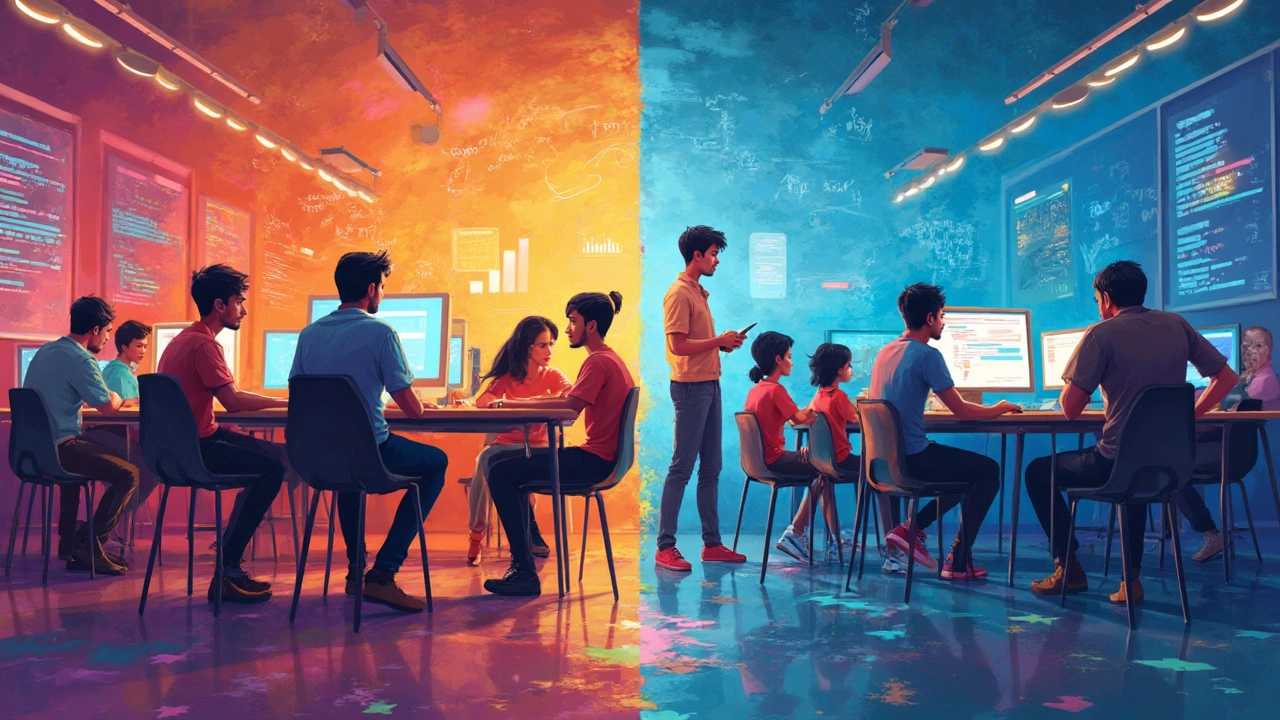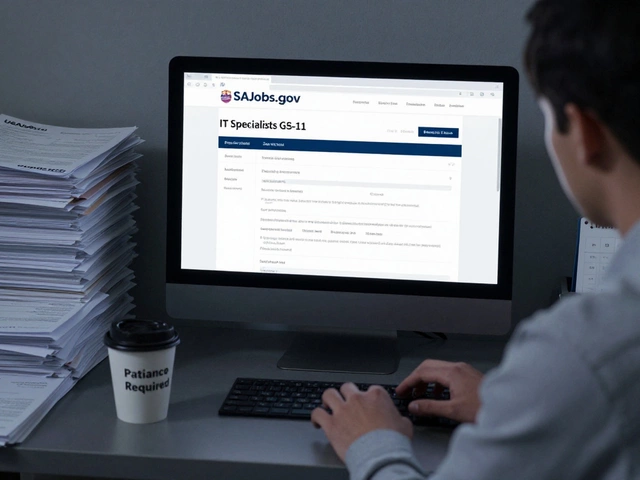Ever wonder if picking up coding is tougher than slugging through math class? You're not alone. Students, parents, even folks in tech keep asking this. The answer isn't as simple as “coding is harder” or “math is impossible.” Both have their pain points, and sometimes, it depends more on how your brain is wired than the subject itself.
Here’s the thing: Coding and math might look like distant cousins, but they mess with your brain in totally different ways. Coding is all about breaking a problem into little, doable steps, then making a machine understand what you want. Math? It’s about making sense of the universe with numbers and rules.
Plenty of people who hated math in school turned out to love coding. Why? The skills don’t line up exactly, and you might be much better at one than the other. So before you sign up for a coding bootcamp or give up after a tough algebra quiz, it pays to know how these two subjects test your skills differently.
- Two Different Beasts: How Coding and Math Work
- What Makes Coding Hard?
- Why Is Math Frustrating?
- Coding vs Math: The Skills You Really Need
- Real-World Stories: Success and Struggles
- Tips If You’re Stuck on One (or Both)
Two Different Beasts: How Coding and Math Work
So, what’s actually going on in your brain when you code versus when you do math? Let’s break it down. Coding is writing instructions—literally telling a computer what to do, step by step. You use programming languages, like Python, JavaScript, or C++, to get things done. You solve practical problems: maybe it’s a game, a website, or a budgeting app. The goal is to make something work, then fix it when it doesn't. Learning to code is a lot like learning to give clear directions to a very literal robot.
Math, on the other hand, is about patterns, logic, and rules. It’s not just about numbers; it’s about how those numbers behave and relate to each other. High school math covers stuff like algebra, geometry, and calculus. Each new topic builds on what you’ve learned before. You solve equations, spot patterns, prove things, and sometimes wonder when you’ll actually use it all in life.
Here’s a big difference: coding is about problem-solving in a creative, almost hands-on way. You can experiment, break stuff, and get instant feedback. Math feels stricter. If the answer’s off, there’s usually no “creative fix”—you have to go back and find exactly where things went wrong. Also, coding lets you see results right away, while math can feel like hammering away without knowing if it’ll pay off anytime soon.
Some coding does use math (think game physics, machine learning, or cryptography), but tons of real-world programming jobs don’t require anything deeper than basic arithmetic or logic. Meanwhile, you can be a total math wizard and feel lost when your code crashes because you added one too many curly braces or forgot a comma.
In short, both skills are valuable, but the way you use your brain—and what’s actually hard about each—can be pretty different. If you’re curious, try dabbling in both. You might be surprised which one clicks for you.
What Makes Coding Hard?
Coding isn’t just about memorizing commands or copying sample code. It's about getting your ideas across to a computer, which only understands things its own strict way. That’s where most beginners hit a wall: if you miss a tiny comma or spell something wrong, your code just crashes. That's not a bug—it's the rule.
A common headache is called "debugging." You write your code, run it, and bam—error message. Sometimes it’s obvious, but a lot of times, you have to comb through piles of text to spot what went wrong. A coding bug can waste hours if you can't pin it down. In fact, according to a Stack Overflow developer survey, nearly 60% of new coders said debugging was their biggest challenge.
There’s also something called the “blank screen problem.” When you first try to code from scratch, it’s hard to know where to even start. Unlike math, where you follow set rules, coding often leaves you with endless ways to solve a problem. That freedom sounds cool, but it can be overwhelming fast.
Here’s a quick rundown of what can make learning coding a pain:
- Computers are super picky about details—spelling, punctuation, even spaces matter.
- When something goes wrong, error messages can be confusing or pointless.
- You have to build “logic skills” as you go—thinking ahead is a must.
- Coding languages each have different quirks. Learning one doesn’t mean you’ll instantly get the next.
- Projects often get stuck because of things like setup issues or tech that changes fast.
For a sense of where beginners struggle most, check out this quick table from a 2024 survey of first-year programming students:
| Common Coding Challenge | % Reporting Trouble |
|---|---|
| Debugging | 59% |
| Understanding Error Messages | 52% |
| Starting a New Project | 44% |
| Remembering Syntax | 38% |
| Switching Between Languages | 29% |
The good part? Coding is brutal at first, but every win sticks with you. The more you stumble, the quicker you figure out how to avoid the same mistakes next time. And trust me, the satisfaction after your code finally works is unbeatable.
Why Is Math Frustrating?
Let’s be honest—math can make even the calmest person want to throw their pencil across the room. There’s a reason so many people say, “I’m just not a math person.” Math overloads you with rules, formulas, and exact answers, so messing up even one little step usually means everything falls apart. That messes with your confidence fast.
One big thing about math: you can't fake understanding. In a survey by the National Center for Education Statistics, nearly 60% of students admitted they struggled to keep up with new math topics. Unlike some subjects, bluffing your way through an essay doesn’t cut it—if you skip a step in algebra or misread a geometry problem, the result is just wrong.
Here's a peek at where students hit the most roadblocks:
- It’s abstract—thinking about imaginary numbers or weird shapes makes your head spin.
- There’s pressure to get it perfect—the answer is either right or wrong, no in-between.
- The topics build on each other—you can’t really move on until you “get” the last chapter.
- Jargon and symbols—math has its own language, which trips a lot of people up.
If you feel stuck in math, you’re not alone. Only 24% of US high school seniors scored at or above the “proficient” level in the latest NAEP math assessment (see the table below). So it’s a common pain point:
| Grade Level | Percentage Proficient |
|---|---|
| 4th Grade | 41% |
| 8th Grade | 34% |
| 12th Grade | 24% |
One reason math feels tougher than coding for some is because it often gets taught in a dry, step-by-step way, with little room to play or experiment. Plus, if your foundation is shaky, every new topic feels like trying to build a house on sand. This is why so many people hit a wall, especially in high school or college-level math.

Coding vs Math: The Skills You Really Need
If you ask someone what skills you need for coding versus math, you’ll often get answers that sound similar: logic, problem-solving, a good memory, and patience. But what’s asked of you in each field often feels wildly different once you jump in.
For coding, you want to be a clear thinker and a good translator. Why? Because the high score goes to whoever can break a messy big problem into bite-sized steps, then give instructions so clear a computer can’t screw them up. You’ll also need a lot of patience when code does exactly what you told it—not what you meant—and keeps throwing that stubborn error message.
- Patience with bugs: Debugging is 40-60% of real-world coding. Google’s own developers spend half their coding time just fixing bugs.
- Clear thinking: You need to organize complex stuff into simple steps.
- Basic logic: If you can follow a recipe or explain how to use a microwave, you’re halfway there.
- Teamwork and communication: Unless you’re coding solo forever, you’ll need to explain what you’re thinking or ask for help.
Now, when it comes to math, it’s a different game. Math is about nailing down rules, following procedures, and, if you’re in advanced territory, wrapping your head around abstract ideas. You deal with set equations, symbols, and steps that rarely budge.
- Pattern recognition: Spotting number trends, seeing how things relate.
- Accuracy: One wrong number and things go off the rails, quick.
- Memorization: You can’t always Google a formula on a test. You gotta remember certain rules.
- Stamina for abstract problems: Some concepts make your brain ache, and you just have to chew through them.
Check out some real stats on what people say trips them up in both fields:
| Skill Struggle | Coding (%) | Math (%) |
|---|---|---|
| Following Logic | 55 | 61 |
| Handling Mistakes | 68 | 54 |
| Remembering Steps/Rules | 38 | 72 |
Notice something? More folks get tripped up in math by having to remember rules, while more coding students feel the squeeze with bugs and fixing mistakes.
"Everyone thinks coding is all about math, but the truth is clear communication is just as crucial. It’s about giving computers instructions—not inventing new equations." — Dr. Anna Lytle, Computer Science Educator
Quick tip: If you get stressed about learning coding because you weren’t a math whiz, relax. Most basic programming doesn’t go past what you learned in middle school math. And if you can explain your thought process, you’ll survive beginner coding classes without knowing calculus or trigonometry.
Real-World Stories: Success and Struggles
Let’s make this real. If you look at famous names in tech, a handful hated math but still crushed it in coding. Steve Wozniak, Apple co-founder, said it straight out: he never enjoyed higher math, but got obsessed with solving practical problems. He built the first Apple computer with next-to-zero advanced math. Meanwhile, a lot of folks who aced calculus hit a wall when learning to code. Why? Coding forces you to juggle logic, creativity, and patience. That blend flips the script.
I remember my friend Priya, who used to get panic attacks over geometry. She signed up for a weekend coding class, expecting the worst. But once she saw her code work, she lit up. The instant feedback from coding hooked her way before equations ever did. Now she writes apps for a living. Her math is still rusty, but she’s a top-notch coder.
On the flip side, Rajesh, a math genius in my college group, crashed hard when he hit his first big coding project. He knew all the formulas and aced every math assignment, but he’d freeze up when a program crashed or needed debugging. In math, if you follow steps, you get to the answer. In coding, your code might fail for a tiny missing comma. It’s a different game.
If you want some hard numbers, check this out:
| Background | Difficulty Learning Coding | Difficulty Learning Math |
|---|---|---|
| Engineering majors | 34% | 29% |
| Arts/Humanities majors | 58% | 67% |
| Self-taught programmers | 49% | 51% |
What jumps out? Coding isn’t just for ‘math people.’ In fact, folks with no math background often shine in coding classes once they stick it out. Struggle isn’t a bad sign—it just means you’re learning something new.
Here’s what helped people break through:
- Working on real-life projects, rather than textbook exercises
- Joining online communities for support and tips
- Doing small chunks every day—consistency beats cramming
The takeaway: It’s totally normal to hit walls, whether you’re coding, doing math, or both. Try different angles, talk to people who’ve been there, and don’t get stuck thinking you have to pick one box—math whiz or coder. Plenty of room in this game for both.
Tips If You’re Stuck on One (or Both)
Feeling blocked by coding or math can be super frustrating, but you’re not doomed. Both have tricks you can use to get unstuck — and trust me, you’re not the only one struggling. Recent surveys show almost 60% of beginners get stuck with coding, while around 40% say math is their biggest school headache.
Here are straightforward things you can do if either, or both, make you want to flip your desk:
- Break Problems Down: Big problems freak people out. Whether it’s an ugly math equation or a bug in your code, chop it into tiny pieces. Ask: what’s the first baby step?
- Use Examples: Don’t just read the theory. Plug in real numbers or test simple inputs and see what happens. In coding, edit some demo code. In math, swap X for your birthday or shoe size.
- Change Your Tools: If you’re stuck, switch it up. Use coding playgrounds (like repl.it or JSFiddle) for instant feedback. For math, try calculators or drawing diagrams.
- Ask for Help Early: There’s no award for worst struggle alone. Forums like Stack Overflow (for coding) or Math Stack Exchange are goldmines. In my house, Ananya always says, “Google is your other best friend.”
- Practice Like You Mean It: Consistent, short practice beats cramming every time. Apps like Duolingo for coding (yes, it exists) or Khan Academy for math make this a lot less boring.
- Notice Your Progress: Make a checklist of little wins, like “wrote my first loop” or “finally solved a quadratic.” Even tiny steps add up, and seeing them written down actually helps your brain stay motivated.
Let’s put the numbers in perspective. Here’s a quick view of how learners feel about getting stuck:
| Roadblock | % Affected in Coding | % Affected in Math |
|---|---|---|
| Difficulty understanding concepts | 49% | 38% |
| Fear of making mistakes | 35% | 42% |
| Lack of helpful examples | 28% | 33% |
| Giving up too soon | 19% | 21% |
Bottom line? It’s totally normal to get stuck — it means you’re trying. The people who make it through either subject aren’t always the most “talented”; they’re the ones who keep showing up and try different approaches. Stick with it, ask for help, and remember, almost everyone is winging it at the start.










0 Comments